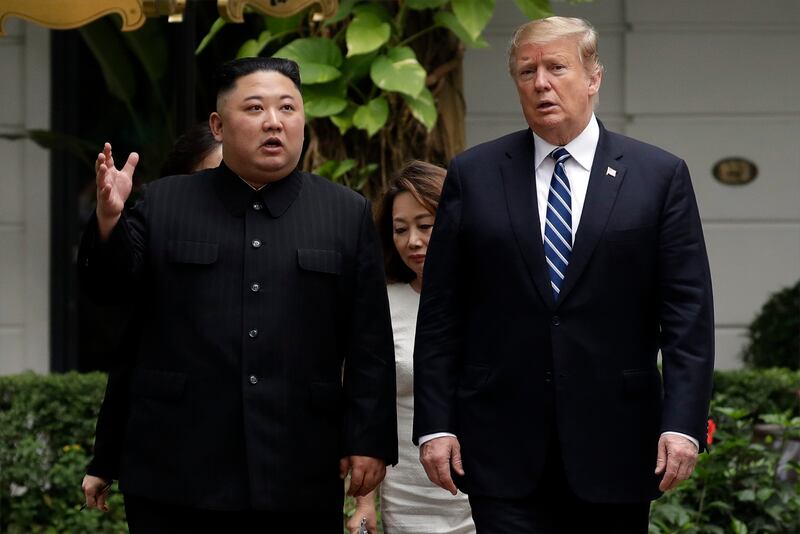Thirty-three years ago this month, President Ronald Reagan famously stood in front of the Berlin Wall and addressed himself to the head of the Soviet Union. “Mr. Gorbachev, tear down this wall!” he said.
Two years later, the wall that had become a symbol of the Iron Curtain — the great separator of the free and prosperous West from the imprisoned, impoverished and tyrannical East — came down. Germans from the east and west joyfully danced atop the barrier and chipped away at it, no longer afraid of being shot as countless people before them had been while trying to cross over.
Two years ago this month, President Donald Trump and North Korean leader Kim Jong Un met for an extraordinary face-to-face summit that ultimately led to a joint statement expressing both nations’ desires to reduce the threat of nuclear attacks and repatriate prisoners being held by the north.
Today, the United States has little to show for those efforts. Instead, Kim’s foreign minister, Ri Son Gwon, marked the occasion by saying North Korea intends to strengthen its military in order to “cope with the long-term military threats from the U.S.”
Ri accused the United States of threatening North Korea with preemptive nuclear strikes and said Washington remains committed to seeking regime change. “The U.S. professes to be an advocate for improved relations … but in fact, it is hell-bent on only exacerbating the situation,” he said.
North Korea followed up those statements in dramatic fashion Monday, destroying an inter-Korean joint liaison building where north and south had been working toward a more friendly arrangement between the two countries. This seemed to signal an end to diplomatic efforts with both the United States and South Korea.
Comparisons between the Soviet Union and North Korea can be incomplete, at best, and meaningless, at worst. Reagan’s admonishment of Gorbachev had the benefit of impeccable timing. The Soviet Union’s twin economic flaws — centralized command and corruption — had rendered it hollow and on the verge of collapse after decades of trying to compete with the West. Gorbachev had the wisdom to see this and usher in a peaceful regime change that granted autonomy to its member states.
Before that happened, the Soviet Union was a legitimate superpower with an impressive nuclear arsenal.
North Korea, on the other hand, has been rightfully labeled a hermit kingdom. It stands virtually alone in its isolation, with only China as a (mostly) reliable ally. Kim hangs onto power through brutal force. His actions seem motivated by a desire to amass enough strength to be considered a player on the world stage, and that legitimacy seems to rest with his ability to develop a credible nuclear threat.
Many of Kim’s tactics seem laughable.
But in one way, the two are similar. As with the Berlin Wall 33 years ago, North Korea today symbolizes tyranny, the absence of human rights and the brutality of state control. Those who escape its clutches bear witness to the awful conditions and the longing of many to be free.
Like the Berlin Wall, the DMZ separates the obvious prosperity of South Korea from the thinly veiled poverty of the north.
As the Trump administration has learned, North Korea is a problem without an easy solution. Its nuclear ambitions must not be taken lightly, but its leaders seem unwilling to engage in meaningful negotiations.
As other presidents have learned, neutralizing this threat will require traveling a long and patient road, enduring frequent setbacks, and it most likely will rely on the cooperation and influence of the Chinese.
But as Reagan demonstrated on that memorable day 33 years ago, hope must never die. The persistent demands of freedom can eventually pay dividends, and the captive can one day roam free.

